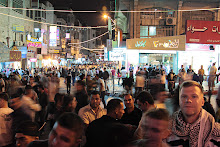Imagining Jerusalem: Multimedia Presentation
Abstract
Building on Edward Said’s notion of “imaginative geographies,” in his book The Colonial Present, geographer Derek Gregory analyzes the tropes and modalities of modern colonialism, bound up in assumptions and assertions based on “imaginative geographies” of the Middle East and South/Central Asia.
Geographers have dedicated a great deal of attention and scholarship to the elements of Said’s imaginative geographies: from notions of identity and nationality, to perceptions of out-groups and the militarization of borders between groups. Israel/Palestine is a bubbling cauldron of all these geographic curiosities—and no wonder, given Said’s Palestinian heritage.
This project, then, aims to illustrate and depict the geographic imaginary of Jerusalem, as held by non-Jerusalemites. Through short interviews, what Jerusalem is and what it means to Americans will be explored—and Jerusalem itself will be populated by these “imaginative geographies.”
Presentation (rough) outline
I. Introduction (~3 minutes)
A. Powerpoint—background on Said & Gregory
B. Application to Jerusalem as object of desire and contest
II. Vignettes (~4 minutes)
A. Description of research method
B. Interview clips
III. Conclusions (~3 minutes)
A. Creation of “imaginative geographies” through contrasting distance and attachment
B. Implications of these constructions on American foreign policy, as well as contemporary Jerusalem
Research method
Interviewees will be chosen from pool of bystanders and students involved in various Israel Independence and Palestinian Nakbah events on the OSU oval. This is a nonscientific, and deliberately nonrandom sampling, in order to solicit opinions and ideas about Jerusalem from people who have vested interests (and therefore who have constructed imaginative geographies in the first place) in Jerusalem as a city and an object of the Israel/Palestine dispute. Interviewees will be asked a series of closed- and open-ended questions, including:
- How many people live in Jerusalem?
- How large an area does Jerusalem encompass? (further prompted by “smaller than Franklin county, about the same size as Franklin county, or larger than Franklin county?”)
- How many Israeli Jews live in Jerusalem?
- How many Palestinians live in Jerusalem?
- Can you name some places in Jerusalem that are important to you?
- What is the status of Jerusalem at present?
- What does Jerusalem mean to you?
- What does Jerusalem mean to Israelis?
- How would you fit in Jerusalem
- What does Jerusalem mean to Palestinians?
- What do you think will be the eventual resolution to the dispute—that is, what will Jerusalem look like?
Interviews will be done on-camera and recorded for editing and display in IS 501 final project, and interviewees will be informed of this prior to interview. Interviewees will not be asked their names, occupations, residency status, religion, marital status, sexual orientation, etc., and interviews, once edited and inserted into multimedia presentation, will be used solely for the purposes of an IS 501 student project and no other research. Unedited interview footage will be deleted, and the edited and finished final presentation will be shown exclusively to the IS 501 (Living Jerusalem 2011) students and instructors, and for no other purpose.


No comments:
Post a Comment